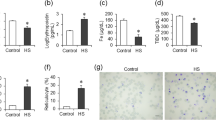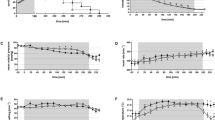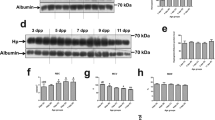Abstract
IN previous communications it was shown that bilateral nephrectomy abolished erythropoiesis in the dog1,2, whereas ureter ligation did not impair erythropoiesis despite a similar state of intoxication and malnutrition3. From these observations as well as the demonstration by Jacobson et al. 4 that an elevated erythropoietin-level was not obtained in hypoxic rats after nephrectomy, it was suggested that the kidney may be the site of production of one erythropoietic stimulating substance.
This is a preview of subscription content, access via your institution
Access options
Subscribe to this journal
Receive 51 print issues and online access
$199.00 per year
only $3.90 per issue
Buy this article
- Purchase on Springer Link
- Instant access to full article PDF
Prices may be subject to local taxes which are calculated during checkout
Similar content being viewed by others
References
Naets, J. P., Experientia, 14, 74 (1958).
Naets, J. P., Nature, 181, 1134 (1958).
Naets, J. P., ibid., 182, 1516 (1958).
Jacobson, L. O., Goldwasser, E., Fried, W., and Plzak, L. F., ibid., 179, 633 (1957).
Naets, J. P., Proc. Soc. Exp. Biol. Med., (in the press).
Fried, W., Plzak, L. F., Jacobson, L. O., Goldwasser, E., ibid., 94, 237 (1957).
Author information
Authors and Affiliations
Rights and permissions
About this article
Cite this article
NAETS, JP. Disappearance of the Erythropoietic Factor from Plasma of Anæmic Dogs after Nephrectomy. Nature 184, 371–372 (1959). https://doi.org/10.1038/184371a0
Issue Date:
DOI: https://doi.org/10.1038/184371a0
This article is cited by
-
Is it time to rethink our management of dialysis patients undergoing elective ventral hernia repair? Analysis of the ACS NSQIP database
Hernia (2015)
-
Erythropoietic properties of plasma and changes in the blood composition in experimental hydronephrosis
Bulletin of Experimental Biology and Medicine (1970)
-
Changes in blood erythrocytes after partial denervation of the kidneys in rabbits
Bulletin of Experimental Biology and Medicine (1964)
-
Zum Problem des Erythropoetins
Blut Zeitschrift für die Gesamte Blutforschung (1960)
Comments
By submitting a comment you agree to abide by our Terms and Community Guidelines. If you find something abusive or that does not comply with our terms or guidelines please flag it as inappropriate.



